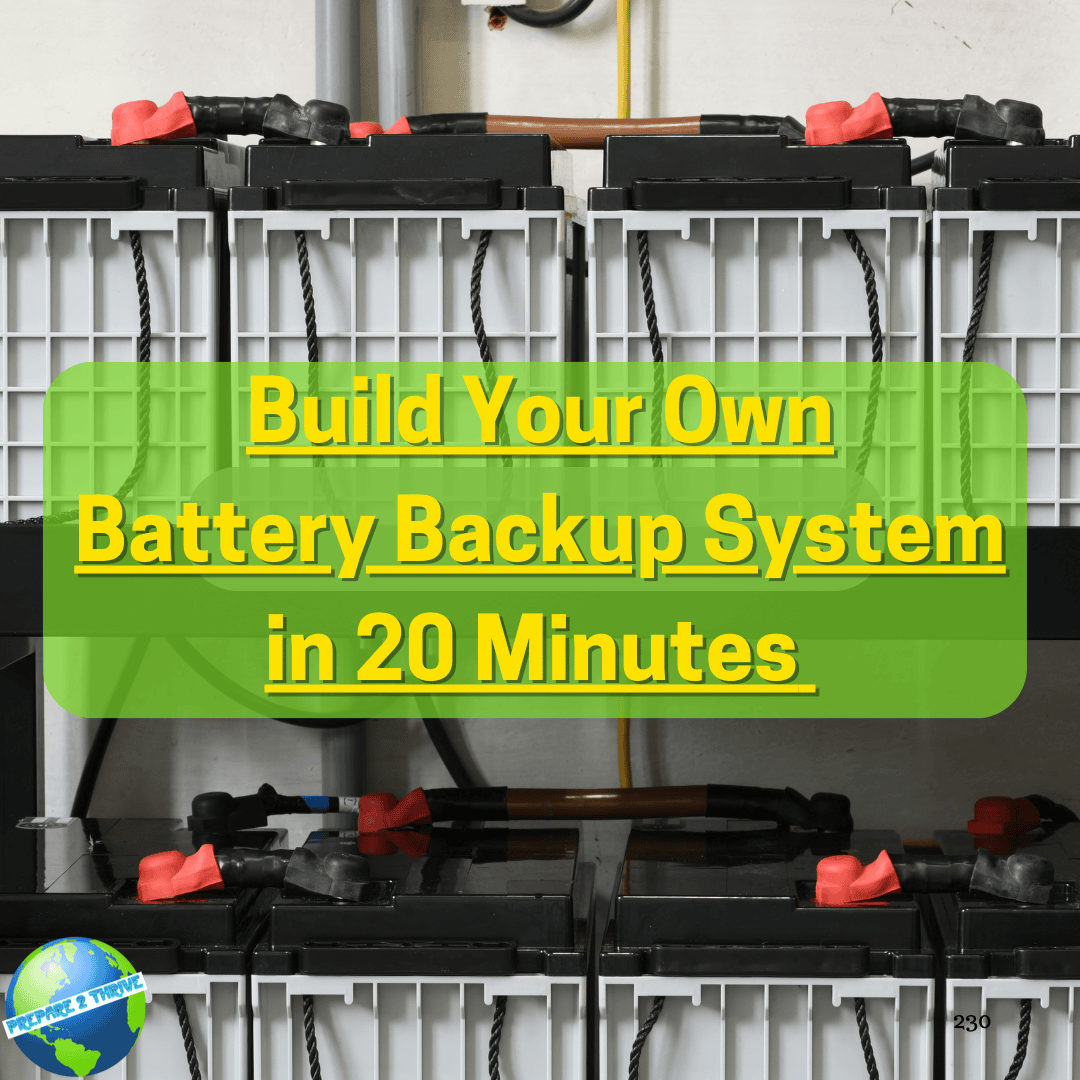If you can install a battery in your car, and connect the red wire to the red post, and the black wire to the black post, then you can build your own battery backup system!
A battery backup system, sometimes called a "solar generator" is a handy system that can power devices like fridges and freezers, charge phones, or even run your entire house. There are many brand-name products available, but in general, they are not a good investment.
In this article we'll explore how you can build you own, with better parts, at a fraction of the price.
A battery backup system consists of three components:
- A battery to store the electricity
- a charger to put electricity in to the battery
- an inverter to convert the batteries DC power to AC power needed for your appliances.

Pre-Made Unit |
Home-Built Unit |
| |
|
| |
|
| |
|
| |
|
| |
|
| |
|
| |
|
| |
|
So how do you build one? Here's the complete instructions.
Price Comparison
Here we're going to compare the Dabbsson DBS2100 Pro Portable Power Station with a unit from 3 components available on Amazon.
Amazon Components:
- 2500w inverter $159.99 - https://www.amazon.com/OUBOTEK-Inverter-Converter-Vehicles-Controller/dp/B0C744F31N
- 100a charger $149.99 - https://www.amazon.com/PM4-100-Power-Converter-Built/dp/B0CKW14R9T
- 2560Wh battery $382.79 - https://www.amazon.com/Lithium-LiFePO4-Certificates-Lifetime-Off-Grid/dp/B08P6HH4WK
Dabbsson DBS2100 Pro |
Amazon Build |
|
| Regular Price | $ 1,799 | $692.77 (61% less expensive / $1100 savings) |
| Sale price | $ 1,199 | $692.77 (42% less expensive / $500 savings) |
| Battery | 2150 Wh | 2560 Wh (+19% longer runtime) |
| Running output | 2400 W | 2500 W (+4% greater output) |
| Peak output | 3600 W | 5000 W (+39% greater output) |
| Charge time to 80% | 2.4 Hours | 1.7 hours (-30% faster) |
With the Amazon build saving you as much as $1100 you could purchase 3 additional batteries, giving you over 10kWh of battery storage for the same price as the Dabbsson unit!
High Quality Components
If you talk to most live-aboard sailors, they opt for high quality equipment at all times. It's one thing to live in a house, and if you have something break down you drive to the store, or have Amazon deliver a new part tomorrow. But when you live on the water, and your "house" could be in the middle of the ocean, there's no easy way to replace parts. For many places in the Caribbean, if you need a new part it can take days, or even weeks to arrive, and may have to be flown in (at your expense).
As a result, the quality and durability of a part is more important than the price. One of the best, most reliable names in the field of electrics is Victron Energy.
On our boat we have a Victron Quattro 48/5000/70 inverter/charger. It runs from our 48 volt battery bank. It has 5000 watts of output, so we can run our entire boat with all the appliances (convection oven, induction range, microwave, washer/dryer, TVs, computers) from this one inverter. The integrated 70 amp charger would be used to charge the batteries when we are connected to shore-power. This unit cost us €2365.
We went with 8 x SimpliPhi LiFePO4 48v 75Ah batteries. This gives us a total storage capacity of 28,800 watt hours, which is enough to keep us going for 4 days of normal living, or more than 7 days if we are very careful of our electrical usage.
While we do have a pair of 20 kW diesel generators as emergency backups, 99% of our power over the last 7 years comes from our solar panels.
We have 12 x 380 watt panels. They can output 4560 watts into a pair of Victron BlueSolar MPPT 150/60 regulators, which charge the batteries.
A typical sunny day will give us 30 kWh of free electricity.
Conclusion
In conclusion, building your own battery backup system offers significant advantages over purchasing a pre-made unit. Not only can you save hundreds or even thousands of dollars, but you also gain full control over the quality of each component and the ability to expand the system to suit your needs. While pre-made systems may be convenient, their limitations in terms of expandability, cost, and transparency make them a less ideal option for those looking for flexibility and long-term reliability. With a bit of time and basic know-how, you can build a system that’s not only more powerful and adaptable but also tailored specifically to your requirements, providing peace of mind in any emergency.






